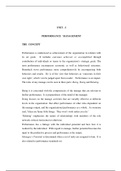UNIT – I
PERFORMANCE MANAGEMENT
THE CONCEPT
Performance is understood as achievement of the organization in relation with
its set goals. It includes outcomes achieved, or accomplished through
contribution of individuals or teams to the organization‘s strategic goals. The
term performance encompasses economic as well as behavioural outcomes.
Brumbach views performance more comprehensively by encompassing both
behaviors and results. He is of the view that behaviors as ‗outcomes in their
own right‘, which ‗can be judged apart from results‘. Performance is an impact.
The roles of any manage can be seen in three parts: Being, Doing and Relating.
Being it is concerned with the competencies of the manage that are relevant to
his/her performance. It is preparedness of the mind of the manager.
Doing focuses on the manage activities that are variably effective at different
levels in the organization: that affect performance of other roles dependent on
the manage output, and the organizational performance as a whole. As someone
said, ‗Ideas are funny little things. They won‘t work unless you do.‘
‗Relating‘ emphasizes the nature of relationships with members of the role
network-vertical, horizontal or otherwise.
Performance has a linkage with the individual potential and how best it is
realized by the individual. With regard to manage, his/her potential becomes the
input to the productive process and performance is the output.
Managee’s Potential is determined when a set of tasks are assigned to him. It is
also related to performance standards set.
,Task-related activities refer to managee‘s or supervisors involvement to achieve
the allocated task or meet expectations in the given task environment.
Performance is what the managee’s actually achieve. Performance in a role
refers to the extent to which the managees achieve the purpose for which the
role is created.
‗Choice, not chance‘, they say, ‗determines destiny‘. The actual performance of
a managee is a function of several forces, internals as well as external to the
organization-some of choice, some of chance. Most organizations do not take
these forces into account-either systematically or intuitively-while building
expectations from a managee. A managee in her task environment could be
subject to some of the influences and factors shown in Exhibit.
Framework to Understand Role Performance
In this framework, Organizational Relevant Environment, Role Purpose or
Objective, Stakeholder Expectations, Role Technology and Input Role or Vendor
,Contribution are inputs to the managee‘s performance. These are substantially
known, and are the factors and forces, which organizational expectations from
the Managee Performance can reasonably be predicted.
Role Design, Managee Potential, Managerial Leadership, Competing and
Collaborating Colleagues, and Group Climate are throughput factors that can be
optimized by a manager to enhance the Managee Performance. These
determine whether the organization‘s performance expectations from a managee
are realistic. As such, throughput factors are the core concerns of PfM.
It can be argued that Role Design and Managee Potential are, in fact, input
factors. However, a manager can modify-enhance or stretch-these factors by
improving the fit between the managee‘s capacities, resources and role
requirements, PfM would assume these as throughput factors.
Role Output or Managee Performance is the end-result-the effect for which we
work. This is the variable that is predicted or planned. It is invariably
observable and measurable. The behavior of all organisms is goal-directed. As
such, people performance is not only a sequence of causes and effects; it is a
chain of sub-goals and actions, leading towards the ultimate goal. In fact, when
a managee has a goal, he/she behaves as if she is following some signposts that
create a healthy expectancy in him/her to reach the goal.
Role Purpose or Objective sets the boundary for the goal(s). It is a reference
point for Stockholder’s Expectation.
Managee Potential corresponds to the role to which a managee is assigned and
the inputs he/she receives to fulfill the role purpose. It stretches or contracts
depending upon the Group Climate, the behavior of the Competing and
Collaborating Colleagues, and the Managerial Leadership. The actual
realization of a managee‘s potential depends heavily on:
, Group and Organizational Purpose.
Group or Organization Capacities and Resources.
Human Climate in the Group or the Organization.
Quality of Up-stream or Vendor Inputs.
Feedback on Performance.
Role Design is fashioned by the organizing process. The sole purpose of
organizing and designing a role is to provide a vehicle for implementing
performance plans and expectations. It determines the requisite competencies,
knowledge and skills. Role design predominantly determines task-related
attributes needed by the managee.
Managerial Leadership predominantly determines the behavioral attributes
needed by the managee. Leadership role of the manager and managerial style of
the leader are also major determinants of the managee‘s development and
his/her job satisfaction. Managerial leadership and group climate have
considerable influence on each other.
Group Climate - The internal psychological environment of the group-influences
the behavior, style and performance of the managee. It is also, in turn
influenced by the behavior and attitude of the managee. Group climate is after
all, the collective outcome of the behavior and attitudes of all the members of
the group-the managee and all his/her competing and collaborating colleagues,
the manager or the leader. People in any group or organization are less anxious
about work if both goal clarity and goal agreement are present. Considerable
conflict arises when purposes are unclear or when people disagree on what the
priorities should be. Without convergence on goals and priorities, groups or
organizations cannot develop a climate that facilitates performance.
Three abilities or forces in an individual are said to be essential for achievement:




